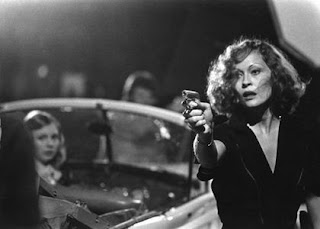Chinatown is, quite possibly, the greatest movie I've ever seen.
Is it my favorite? Having seen it only in bits and pieces prior to Monday, when I watched it for the first time from beginning to end--it is far too early to make such a claim. But from a critical perspective, it's safe to say it's one of the best.
The story is referred to on the Netflix sleeve logline my DVD came in as "onion-like" in its layers' revealing. And the Red Envelope's not kidding. The story takes many twists and turns, but it never feels forced or convoluted. It manages to surprise without making each surprise seem gimmicky--a tough thing to accomplish.
The direction by a post-Manson, pre-fugitive Roman Polanski is A-class. It's easy to imagine that Polanski's worldview, just a few years after the savage murder of his pregnant wife, had a profound impact on the pessimistic outlook of Chinatown. In fact, Polanski butted heads with producer Robert Evans over the film's dour (but unforgettable) final few pages. Polanski, thankfully, won out, and "Forget it, Jake...it's Chinatown" entered into the American popular lexicon forever.
In fact, it's hard to find a single thing not to rave about in this movie, except maybe Faye Dunaway's occasional propensity to chew the scenery a bit. But one signs up for that when one watches a movie with her in it, anyway.
The "neo-noir" begins with Chinatown, released about fifteen years after the classical noir period ended with Touch of Evil (1958). Anyone with an interest in film history or style would do well to watch these two movies back-to-back. It's amazing how Welles' Evil is so clearly an "old" movie--a movie rooted in the classical aesthetic and ideology of the Hollywood studio system (its 'latin' protagonist, for example, is portrayed by a laughably-darkened Charlton Heston). In less time than it's taken us to go from Jurassic Park to Avatar--A period of technical, but not much artistic, progress--Welles' generation had passed the torch to the Copollas, Polanskis, and Scorceses of the 1970s.
A corpulent Welles in Touch of Evil (1958)
Chinatown is particularly impressive as a neo-noir because it does not rely on superficialities to reveal its heritage. Many films have attempted to follow in the noir tradition by reverting to black-and-white, high-key, Expressionist cinematography and hard-boiled dialogue. While there is something to be said for that kind of pageantry (2005's Sin City springs to mind), Chinatown manages to channel the spirit of unease and corruption endemic in the Angelino landscapes of classic noir, while invigorating the form with the aesthetic advances of 1960s and 70s "art" cinema of Europe. (To Evans' credit, this was why he hired a European director to reinvent an American genre in the first place.)
Lastly, I am a sucker for any piece of art which spotlights the history of Los Angeles. The Southland is my home, but as a place, it doesn't seem to garner much artistic attention. I feel as though the other great cities of the world--New York, London, Tokyo, Paris, Rome--are all better-represented historically in fiction and nonfiction. Los Angeles, I suppose, lacks the romanticized history of a Rome or the visual theatricality of New York. But Los Angeles, more so than any of those other places, feels like it harbors a million secrets, a million stories left to be told. The greater Los Angeles area is a sandbox for the imagination--the deserts, beaches, mountains, and spread-out suburban jungle in the middle provide unlimited opportunities for an individual to get lost. Far more so than those other cities, I feel, Los Angeles provides a richly diverse array of stories to be told. (In the last decade, perhaps only 2000's Mullholand Drive and 2004's Grand Theft Auto: San Andreas take full advantage of L.A.'s mythological potential.) This film, however, interweaves the political history of L.A.'s landed gentry into the fiber of the movie--Chinatown simply could would not make sense anywhere else.
A million and one stories are out there.
Chinatown: If you've never seen this great American film, watch it. If you have seen it, watch it again.






No comments:
Post a Comment